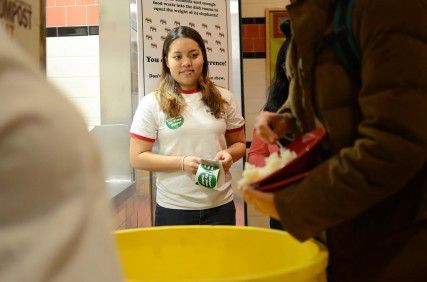
Boston University Dining Services teamed up with Club Get Involved in Volunteer Experiences to hold an environmental awareness campaign in dining halls across the Charles River Campus Tuesday.
“Composting Comes Out” encouraged students to become aware of the dining halls’ food disposal process by giving them the choice to either clean their plate or scrape their unused food and napkins into a compost barrel, said Club GiiVE Secretary Alanna Raskin.
“Through composting and sustainability, we’re showing students what happens behind the scenes, because most students don’t realize that everything gets composted,” Raskin said. “They also don’t understand that when they eat half of their meal and put it on the dish belt, they’re wasting that much food.”
Members of Club GiiVE were stationed at the dish belts with compost barrels. Students who cleaned their plates, thereby wasting nothing, were rewarded with stickers and asked to tweet pictures of their empty plates with the hashtag #BUCleanPlate.
“We’re hoping to get people excited,” Raskin, a College of General Studies sophomore, said. “That’s why we’re doing the competition with the pictures and Twitter. We want students to understand, and we think they’ll respond well. We’re hoping this will reduce waste in the dining hall.”
BU Dining Services reached out to Club GiiVE to hold the campaign after students expressed concern for the disposal of their food waste in the Fall Dining Survey, said BU Dining Services Sustainability Coordinator Sabrina Pashtan.
“This is an exercise, both in awareness of our composting efforts everyday behind the scenes and a campaign to advocate for the reduction of post-consumer food waste,” Pashtan said. “When students were asked in the Dining Fall Survey 2013 what kinds of sustainability initiatives were most important to them, the reduction of food waste was one of the top responses.”
Swanson Ninan, a College of Arts and Sciences junior, said seeing all the food wasted each day made him more mindful of taking appropriate amounts of food for each meal.
“Just finishing your food yourself or asking a friend if they want to finish your leftovers is really easy,” Ninan said. “I will definitely be way more cognizant of finishing the food on my plate and also taking the right portions, so that I’m only eating what I’m actually hungry for.”
College of Engineering sophomore Akram Habibi, said although BU makes an effort to be ecofriendly, students are not entirely aware of their environmental footprint.
“It’s a great idea to make people aware of what they’re throwing out,” Habibi said. “I don’t think students are that aware. BU does strive to give people the opportunity to actually help out, but I don’t think people realize how much they do waste. I actually still don’t realize how much.”
Vincenza Rico, a CAS freshman, said in a world where millions are starving, those who have enough should remain mindful of conserving the nourishment they are fortunate to have.
“Food shouldn’t be wasted,” Rico said. “Composting things like that is something we take for granted when there are people who don’t have enough food. We’re just throwing away extra stuff.”
CAS senior Kathryn O’Neill, who managed the compost station, said the compost campaign helped students to understand the implications of their actions on the environment.
“I heard a couple people say they didn’t know food was composted, so they were really happy to hear about that,” she said. “… It kind of helped students link things they normally wouldn’t link to the environment, and now they can put two-and-two together to see that even small actions can have a really big difference when they start a pattern and make better decisions for the environment.”
This is an account occasionally used by the Daily Free Press editors to post archived posts from previous iterations of the site or otherwise for special circumstance publications. See authorship info on the byline at the top of the page.



